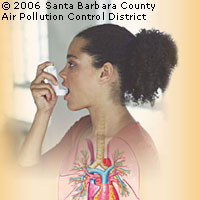Scientists identify 'asthma gene'
EU-funded researchers have identified a gene that is associated with an increased risk of developing childhood asthma, raising the hope of new therapies to treat the condition. Asthma is caused by a combination of different environmental and genetic factors. However, these factors are still poorly understood. Writing in the journal Nature, the scientists explain how children with certain genetic markers on chromosome 17 were 60% to 70% more likely to suffer from asthma than children without the markers. Children with these markers were found to have higher levels of a protein called ORMDL3 in their blood, and the next step for the researchers is to work out how this protein influences a child's susceptibility to asthma. EU funding for the work came from the Sixth Framework Programme (FP6) project GABRIEL, which is investigating the genetic and environmental causes of asthma in the EU. 'Our results have found the strongest genetic effect on asthma so far discovered,' said Professor William Cookson of Imperial College, who coordinated the study. 'We do not yet know how ORMDL3 affects asthma susceptibility. Similar genes are found in primitive organisms such as yeast, so we suspect that ORMDL3 may be a component of quite ancient immune mechanisms.' Professor Gonçalo Abecasis of the University of Michigan, one of the co-authors of the paper, is optimistic that the team's discovery will lead to new treatments for asthma. 'I think eventually it will lead to new therapies because it points to a specific biological molecular pathway,' he said. 'Once we understand the biology and we know the players, it's possible to target it with drugs.' Meanwhile the hunt for other genes involved in asthma goes on. 'These novel findings do not explain completely how asthma is caused, but they do provide a further part of the gene-environment jigsaw that makes up the disease,' commented Dr Miriam Moffatt of Imperial College. 'We and our colleagues are currently preparing even bigger studies to find other genes of smaller effect, and to relate these to environmental factors that protect against asthma. Our eventual aim is to be able to prevent the disease in susceptible individuals.' Identifying the genetic markers involved in asthma was a painstaking process. The scientists compared the genetic makeup of 994 asthma patients and 1,243 non-asthmatics. In their hunt for genes associated with childhood asthma, they trawled through over 300,000 mutations called single-nucleotide polymorphisms (SNPs), which are mutations affecting a single letter of the genetic code. They also looked at which genes were activated in human blood cells. They then confirmed their results by analysing the genetic makeup of over 2,000 German children and over 3,000 British adults who were born in 1958 and had been followed up for the presence of disease throughout their lives. Asthma is the most common chronic childhood disease in Europe, and it costs the EU over €3 billion every year. The prevalence of asthma varies widely across Europe; in the UK, one child in seven is affected by asthma.



